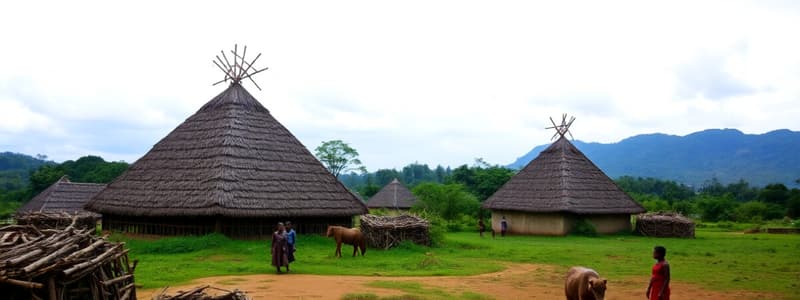Podcast
Questions and Answers
What was a common perception of anthropology by colonial governments as the colonial era ended?
What was a common perception of anthropology by colonial governments as the colonial era ended?
- It was looked upon with skepticism due to its ties to colonialism. (correct)
- It was appreciated for its scientific contributions to society.
- It was regarded as a valuable tool for understanding indigenous cultures.
- It was considered essential for governance in new nations.
Which of the following summarizes the charges against anthropology in the British colonies?
Which of the following summarizes the charges against anthropology in the British colonies?
- It served the interests of colonial powers through functionalist analysis. (correct)
- It was used to promote humanitarian causes.
- It primarily focused on preserving indigenous cultures.
- It advocated for independence movements in colonized regions.
What was one major problem in communication between administrators and indigenous populations during fieldwork?
What was one major problem in communication between administrators and indigenous populations during fieldwork?
- Anthropologists were fluent in local languages.
- Administrators employed official interpreters who were government workers. (correct)
- Indigenous people refused to engage with outsiders.
- Fieldworkers did not record their interactions thoroughly.
How did colonialism affect the practice of ethnography in the Naga Hills?
How did colonialism affect the practice of ethnography in the Naga Hills?
What was the main concern regarding the relationship between anthropology and colonialism as exposed by Project Camelot?
What was the main concern regarding the relationship between anthropology and colonialism as exposed by Project Camelot?
What was one consequence of the colonial attitudes and policies on the tribes in Northeast India?
What was one consequence of the colonial attitudes and policies on the tribes in Northeast India?
What investigative modalities were predominant in the Naga Hills during the colonial period?
What investigative modalities were predominant in the Naga Hills during the colonial period?
How did the British use ethnographic knowledge in relation to the Nagas?
How did the British use ethnographic knowledge in relation to the Nagas?
What was a characteristic of the colonial protectionist policy?
What was a characteristic of the colonial protectionist policy?
What negative image is perpetuated by colonial discourse regarding the Naga tribes?
What negative image is perpetuated by colonial discourse regarding the Naga tribes?
Flashcards
Anthropology's Early Blind Spot to Colonialism
Anthropology's Early Blind Spot to Colonialism
Before World War II, anthropologists largely ignored the effects of colonialism on their research and the societies they studied. Post-war, as colonies gained independence, the relationship between anthropology and colonialism came under scrutiny.
Postcolonial Distrust of Anthropology
Postcolonial Distrust of Anthropology
New nations, especially in Africa and Asia, viewed anthropology with suspicion due to its historical connection to colonialism. This distrust stemmed from the perception that anthropology was a tool of colonial rule.
Fieldwork and Colonial Collaboration
Fieldwork and Colonial Collaboration
Fieldwork in colonial settings involved close collaboration between anthropologists and colonial officials. The power dynamics of colonialism provided anthropologists with access to communities, while colonial administrators often saw fieldwork as a beneficial tool for understanding and controlling populations.
Ethnographers' Limited Access in Colonial Context
Ethnographers' Limited Access in Colonial Context
Signup and view all the flashcards
Publication and Funding Ties to Colonial Interests
Publication and Funding Ties to Colonial Interests
Signup and view all the flashcards
Colonial Protectionist Policy
Colonial Protectionist Policy
Signup and view all the flashcards
Cultural Technologies of Rule
Cultural Technologies of Rule
Signup and view all the flashcards
Ethnography as a Tool of Colonial Power
Ethnography as a Tool of Colonial Power
Signup and view all the flashcards
Colonial Discourse on the Nagas
Colonial Discourse on the Nagas
Signup and view all the flashcards
Ethnographic Knowledge Collection
Ethnographic Knowledge Collection
Signup and view all the flashcards
Study Notes
History of Naga Anthropology (1832-1947)
- The book covers the history of Naga anthropology from 1832 to 1947.
- The relationship between anthropology and colonial administration in the Naga context is explored.
- Colonial expansion brought the British into contact with the Nagas. The interactions had different phases, beginning with military encounters, transitioning to political control and eventually an administrative stage.
- Ethnographic works on the Nagas mirrored the phases of British involvement. Early works focused on data gathering, while later works aimed for a deeper understanding of social structures.
- Naga ethnography became a tool for colonial administration, providing information for governance.
- The methods used in ethnographic research were primarily aimed at understanding and colonizing the Naga people.
- Ethnographers, both military and civil staff, played a crucial role in collecting and recording information regarding local customs, beliefs, customs and their way of life
- There were efforts to rescue and preserve Naga culture, which was facing extinction.
- One key issue to examine is the shift from portraying Nagas as 'savages' to subjects under British rule.
- The relationship between anthropology and administration was intimate but often one-sided, with anthropological knowledge being used for administrative purposes.
- The book examines how ethnographic information was used by the British to control and administer the Nagas.
- A critical issue is the evolution of Naga Ethnography through different phases and the potential biases embedded.
Khoma Fort
- Khoma Fort was a site of significant Anglo-Naga battles.
- It was in existence from 1825, undergoing reconstructions and demolitions.
- Key battles took place there between 1850 and 1879.
- The fort was considered one of the strongest in the region by British military.
Studying That Suits You
Use AI to generate personalized quizzes and flashcards to suit your learning preferences.
Related Documents
Description
Explore the intricate history of Naga anthropology from 1832 to 1947. This quiz delves into the relationship between colonial administration and ethnographic research in the Naga context, detailing how these engagements evolved over time. Understand the role of ethnographers in shaping the governance and documentation of Naga culture during colonial rule.




